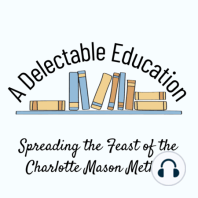37 min listen

Episode 38: Shakespeare
Episode 38: Shakespeare
ratings:
Length:
35 minutes
Released:
Jul 14, 2016
Format:
Podcast episode
Description
In this week's podcast, we discuss why Shakespeare was always included in Charlotte Mason's curriculum. What is the value of Shakespeare as part of the study of literature, and how can we who have little experience with his works enter in and enjoy his feast? Listen Now: If you are seeing this message, please make sure you are using the most current version of your web browser: Internet Explorer 9, Firefox, Chrome "Just as we partake of that banquet which is 'Shakespeare' according to our own needs and desires, so do the children behave at the ample board set before them; there is enough to satisfy the keenest intelligence while the dullest child is sustained through his own willing effort." (Vol. 6, p. 245) "We probably read Shakespeare in the first place for his stories, afterwards for his characters, the multitude of delightful persons with whom he makes us so intimate that afterwards, in fiction or in fact, we say, 'She is another Jessica,' and 'That dear girl is a Miranda'; 'She is a Cordelia to her father,' and, such a figure in history, 'a base lago.' To become intimate with Shakespeare in this way is a great enrichment of mind and instruction of conscience. Then, by degrees, as we go on reading this world-teacher, lines of insight and beauty take possession of us, and unconsciously mould our judgments of men and things and of the great issues of life." (Vol. 4, p. 72) "This is what Shakespeare, as great a philosopher as a poet, set himself to teach us, line upon line, precept upon precept. His 'Leontes,' 'Othello,' 'Lear,' 'Prospero,' 'Brutus,' preach on the one text––that a man's reason brings certain infallible proofs of any notions he has wilfully chosen to take up. There is no escape for us, no short cut; art is long, especially the art of living." (Vol. 6, pp. 314-15) "And Shakespeare? He, indeed, is not to be classed, and timed, and treated as one amongst others,––he, who might well be the daily bread of the intellectual life; Shakespeare is not to be studied in a year; he is to be read continuously throughout life, from ten years old and onwards. But a child of ten cannot understand Shakespeare. No; but can a man of fifty? Is not our great poet rather an ample feast of which every one takes according to his needs, and leaves what he has no stomach for?" (Vol. 5, p. 224) Something Wicked This Way Comes, Ray Bradbury The Winter of Our Discontent, John Steinbeck Brave New World, Aldous Huxley Roller Skates, Ruth Sawyer The Wonderful Winter, Marchette Chute Tales from Shakespeare, Charles and Mary Lamb Beautiful Stories from Shakespeare, E. Nesbit (Contains affiliate links) Interview with Nancy Kelly Chronological List of Shakespeare's Plays American Shakespeare Center
Released:
Jul 14, 2016
Format:
Podcast episode
Titles in the series (100)
Episode 26: Charlotte Mason, Food for Mothers: Charlotte Mason's education is not just for children. This podcast is a discussion of three mothers who have found that Mason has influenced them in ways they never could have dreamed when they took up her methods. Listen to discover all the ways the del by A Delectable Education Charlotte Mason Podcast